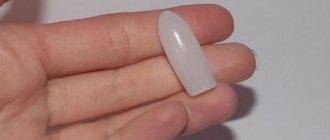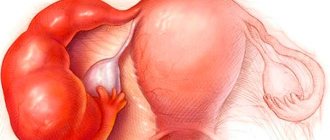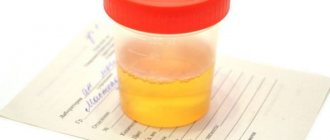Nowadays, many women have increasingly begun to give preference to natural drugs for the treatment of diseases, that is, those created from environmentally friendly natural raw materials using modern technologies. Because these drugs have nutritional, anti-inflammatory, antimicrobial effects and many other equally beneficial effects for health. Natural preparations usually have a minimum of side effects and contraindications, and therefore are well tolerated by people of various age categories.
For the treatment of gynecological diseases, the use of natural remedies for many years has not been limited only to herbal remedies. The first line of the list of mineral medicines is occupied by ichthyol suppositories; in gynecology, according to reviews, they successfully treat many diseases.
Ichthyol in medicine
Ichthyol was introduced into medical practice in the mid-80s of the nineteenth century and turned out to be extremely useful for the treatment of skin diseases, gout and rheumatism. Under the influence of ichthyol, acute and chronic rheumatism and all forms of eczema were quickly cured, even when salicylic acid was powerless. For sprains, bruises, mastitis, etc., ichthyol is the best anti-inflammatory agent. Today, drugs containing ichthyols have been successfully used in the complex therapy of urological and gynecological diseases. This is confirmed by the available reviews on the use of ichthyol suppositories in gynecology.
The action of ichthyol in the composition of drugs has the following effects:
- Marked decrease in inflammatory reactions.
- Destruction of microorganisms or delay in their reproduction and development, i.e. antiseptic effect.
- Local anesthetic.
- Strengthens and accelerates the process of formation of the stratum corneum of the epidermis, i.e. has a keratoplastic effect. The use of ichthyol suppositories in gynecology, according to reviews, is very popular.
What it is?
Ichthyol (ammonium bituminous sulfonate) is the active component of the drug, which is an oily substance, black in color and characterized by a pungent odor. This substance is produced by chemical treatment of oil shale. Ichthyol in the treatment of thrush has the following effects:
- antiseptic;
- anti-inflammatory;
- painkillers;
- improves blood circulation;
In the area of action of the drug, the epithelium is regenerated, pain disappears, swelling is relieved, inflammatory infiltrates resolve, and blood circulation is stabilized.
What effect do they have?
When used in the affected area of candles, the main component of which is ichthyol:
- the epithelial cover is restored;
- pain decreases;
- tissue swelling is eliminated;
- infiltrates, which are an accumulation of cells of histiocytic and vasogenic origin against the background of inflammatory edema, resolve;
- expansion of capillary and blood vessels occurs;
- improves metabolic processes and the functioning of the circulatory system.
Characteristics of the active substance
Ichthyol - ammonium bituminous sulfonate - is a black oily substance with a pungent odor, released during multi-stage chemical processing from oil shale containing the remains of fossil marine animals and fish. Ichthammol was first used as a medicine in the 19th century for skin diseases. And over time, the drug began to be successfully used as part of complex therapy for gynecological and urological diseases.
The effect of the drug is due to the action of ichthyol:
- pronounced anti-inflammatory;
- antiseptic (the therapeutic effect is similar to Vishnevsky ointment);
- local anesthetic;
- keratoplasty.
When using candles in the affected area:
- epithelial covers are restored;
- pain sensations decrease;
- tissue swelling is eliminated;
- inflammatory infiltrates resolve;
- blood vessels and capillaries dilate;
- blood circulation improves.
Indications for use
According to reviews, ichthyol suppositories in gynecology are used in complex therapy for the treatment of the following infectious and inflammatory diseases of the pelvic organs in women:
- various types of inflammation of the uterus and appendages (salpingo-oophoritis, adnexitis, salpingitis) that occur when infection spreads from the vagina;
- inflammatory processes in the uterine mucosa (endometritis) and in the area around the uterus (parametritis);
- inflammatory processes and erosive lesions of the epithelial layer of the cervical canal of the cervix (cervicitis);
- inflammatory processes in the vaginal mucosa (colpitis) and bacterial vaginosis.
According to reviews, in gynecology, ichthyol suppositories (the instructions confirm this) when applied topically are well absorbed by the mucous membranes, which makes it possible to achieve the most effective effect on the source of the disease.
How to use the medicine correctly?
Ichthyol suppositories should not be used without a doctor’s permission
Before starting therapy, you should consult a qualified doctor. Self-medication can cause complications or unpleasant consequences. According to the instructions, ichthyol suppositories are used exclusively rectally. But there are patients who, without complete information and without medical assistance, insert suppositories into the vagina.
This is not the way to treat diseases of the reproductive system. Improper use of the medicine causes not only discomfort, but also characteristic symptoms. The vaginal walls, under the influence of active substances, react negatively to the medicine. Sometimes painful sensations appear. To get rid of the symptoms of discomfort, you need to wash yourself well, then do the douching procedure using sterilized water without additives.
If a woman is diagnosed with an ovarian cyst, the doctor prescribes her a course of treatment with ichthyol, 3 suppositories every day. During therapy, it is recommended to use panty liners to prevent contamination of underwear. You can increase the therapeutic effect; before administering the medicine, it is recommended to do a cleansing enema. This promotes good absorption of active substances. The course of treatment is determined by the attending physician, taking into account the individual characteristics of the patient.
Initially, ichthyol was produced as an ointment for the treatment of furunculosis, hemorrhoids and fissures, skin burns, and some gynecological diseases. At the moment, anti-inflammatory suppositories with this active substance are widely used in gynecology. This form of the medicine greatly simplifies its use. The drug is prescribed for the following diseases:
- inflammation of the ovaries (adnexitis, salpingoophoritis);
- inflammatory processes in the uterus (endometritis, parametritis);
- diseases that are localized in the vagina (colpitis, bacterial vaginosis);
- diseases of the cervix (cervicitis, erosion).
Most women, if it is necessary to use anti-inflammatory drugs in gynecology, prefer natural remedies. They have a milder, more gentle effect, and extremely rarely cause complications or side effects. Ichthyol suppositories are popular in gynecology as a mineral, natural, natural medicine, which is used to restore the epithelial covers of mucous membranes, epidermis, remove excess fluid from tissues, which promotes the resorption of the inflammatory infiltrate, and minimize the processes of decay and fermentation.
Instructions for use
Ichthyol suppositories are produced in the form of rectal suppositories, consisting of a useful medicinal substance and a base. However, many experts recommend that women use ichthyol suppositories vaginally, which can lead to discomfort in patients due to irritation of the mucous membrane of the internal genital organs. It may be caused by individual intolerance to some components of the drug, so before use it will be useful to consult a doctor, as well as douche the genitals with ordinary sterilized water.
According to doctors, ichthyol suppositories in gynecology are usually well tolerated.
Vaginal candidiasis - the whole truth about the disease and its treatment
Have you been fighting thrush for many years without success?
Head of the Institute: “You will be amazed at how easy it is to cure thrush by taking it every day.
Vaginal candidiasis is a disease based on fungal infection of the skin and mucous membranes of the vagina. This condition is a manifestation of weakened immunity, which leads to excessive growth of the Candida fungus. Sometimes candidiasis is called thrush, as it is characterized by the appearance of a white milky coating with a sour odor on the skin and mucous membranes. This disease is common in both men and women. In addition, it often develops in children, which is due to the immaturity of their immunity.
The development of the disease is based on the overgrowth of a fungus of the genus Candida, usually Candida albicans, a yeast fungus that is part of the opportunistic flora. Under favorable conditions, it begins to actively multiply, causing various manifestations in the body.
Our readers successfully use Candiston to treat thrush. Seeing how popular this product is, we decided to bring it to your attention. Read more here...
The main factors contributing to the development of the disease are:
- Decreased immunity due to hypothermia, various immunodeficiency conditions,
- Wearing tight synthetic or wet clothing,
- Long-term use of antibacterial drugs.
There are several types; this classification is based on the prevalence of fungal infection:
- The local form of candidiasis includes isolated damage to the skin and mucous membranes (groin folds, labia, oral mucosa, genital tract - thrush, etc.)
- Systemic or visceral candidiasis is a severe fungal infection of the mucous and submucosal membranes and internal organs. Develops in cases of severe immunodeficiency conditions.
- The generalized form also develops with severe disorders of the immune system, and manifests itself in the form of lesions in 2 or more localizations, for example, candidiasis of the gastrointestinal tract. It may also manifest itself as a combination of local and visceral forms.
Vaginal candidiasis, or thrush, refers to local forms of fungal infection. Normally, the mucous membrane of the genital tract is home to a number of microorganisms that are safe for human health, including fungi. They form the normal microflora of the vagina. When conditions change, for example, when the body's immunity decreases, or when antibiotics are used, active growth of Candida is observed.
In this case, a characteristic white coating with a sour odor is observed on the mucous membrane. Damage to the mucous membrane of the labia and vagina provokes itching and discomfort. There may be a burning sensation when urinating. Symptoms of vaginal candidiasis intensify after coitus (sexual intercourse), as well as after menstruation.
It is easy to suspect vaginal candidiasis based on the appearance of characteristic symptoms. But you should know that sometimes sexually transmitted diseases (gonorrhea, trichomoniasis, etc.) are hidden under the mask of thrush. In addition, a long course of this disease can provoke the development of adhesions in the pelvic cavity, which is one of the causes of infertility in women.
The diagnosis is made based on examination and detection of Candida albicans fungi in a vaginal smear. But to prescribe adequate treatment, it is also necessary to determine whether vaginal candidiasis is one of the manifestations of a generalized form of fungal infection. In addition, the possible cause of this condition is determined. To do this, you need to conduct a comprehensive examination of the body, the results of which can only be interpreted by a doctor.
Treatment of thrush should be comprehensive and include a number of measures:
- medication treatment,
- traditional medicine,
- diet,
- lifestyle change.
Drug treatment for vaginal candidiasis includes:
Most often used:
- Herbal medicine is treatment with plants. Decoctions and tinctures of various herbs and their preparations have anti-inflammatory, antimicrobial, and healing effects.
Chamomile, for example, has an anti-inflammatory effect. Its decoction is used for douching and sitz baths.
Eucalyptus has a powerful antimicrobial effect. Use its decoction (30 g per 200 ml of boiling water) for douching and applications.
Calendula also has a calming and antimicrobial effect; it is used in the form of a decoction for douching and applications.
The most commonly used combination is: yarrow, chamomile flowers, salvia officinalis leaves, juniper berries, calendula flowers, eucalyptus, birch and poplar buds. Plants are taken in equal quantities. Brew 2 tbsp. l. 2 cups boiling water. The resulting decoction is used for washing, douching and putting tampons.
For vaginal candidiasis, foods containing yeast (yeast dough, beer, kvass) should be excluded. Nutrition should be complete and include proteins, fats and carbohydrates, as well as vitamins, which will support the immune system.
Smoking, frequent and excessive consumption of alcohol contribute to a decrease in the body's protective functions, which contributes to even greater impairment of the immune system.
The main measure to prevent thrush is to strengthen local and general immunity, as well as maintain normal microflora of the vaginal mucosa. To do this, you should lead a healthy lifestyle and avoid promiscuity. If long-term use of antibiotics is necessary, prebiotics should be used in parallel to promote the formation of a normal microbial environment of the mucous membrane.
In any case, you cannot self-medicate without establishing the exact cause of the disease, as this can lead to consequences that are much more serious than the disease itself.
How often to use?
Depending on the manifestation of the symptoms of the disease, suppositories are recommended to be used 1-2 times a day. The treatment course is usually 10 days. When using rectal suppositories, administration is carried out only after the intestines have spontaneously cleared themselves or after using an enema as intended.
Ichthyol suppositories are used 3 times a day for ovarian cysts. To prevent soiling of underwear, it is necessary to use daily sanitary pads. The duration of the course of treatment is determined by the doctor who prescribes the appropriate treatment for the disease.
Application
Suppositories are administered rectally, that is, into the rectum. In gynecology, vaginal administration is permitted. However, patients noticed the occurrence of unwanted side effects, there is a risk of damage to the vaginal mucosa, burning and itching.
You should not prescribe candles for yourself. Even drugs of natural origin can cause side effects. Candles can be used 2 times a day with pronounced symptoms of the disease. The average course duration is 1.5-2 weeks.
It is better for the patient to administer suppositories in a lying position. You need to bend your legs slightly towards your stomach and inject the medicine into the rectum. When using the drug vaginally, the procedure can be performed while standing. It is recommended to remain in a lying position for 30 minutes.
In urology
Ichthyol drugs are often prescribed for chronic prostatitis. The course of treatment is prescribed only by the attending physician, depending on the patient’s medical history. If there are contraindications, it is recommended to use other therapy.
After 2 weeks of constant use of suppositories, it is recommended to take a break for 10 days. The attending physician may change the dosage regimen for more effective treatment. If side effects occur, it is recommended to discontinue therapy.
In gynecology
The instructions for use recommend using ichthyol suppositories for the treatment of female diseases. In gynecological practice, the medication is prescribed quite often, as it has antifungal and anti-inflammatory properties.
Usually the gynecologist prescribes a weekly course of treatment. For chronic diseases, therapy is extended for several weeks. The doctor decides which method of administration to choose - vaginal or rectal.
In proctology
The main application in proctology is the treatment of hemorrhoids. The drug helps prevent the appearance of new nodes on the sphincter (a ring of muscles in the anus that acts as a permeable valve) and has an analgesic effect.
The medicine helps soften the tissues of the rectum and eliminate spasm of the sphincter muscles. Drug treatment is indicated for 1 week. In case of exacerbation of symptoms, it is allowed to use suppositories 3 times a day. Suppositories with ichthyol make defecation easier.
Contraindications and side effects
According to reviews, ichthyol suppositories can be used by everyone in gynecology. There are no restrictions on the use of the drug. For the most part, the use of ichthyol suppositories does not cause adverse reactions. Only in a very small percentage of cases, patients hypersensitive to the drug experienced increased body temperature, itching and burning, as well as allergic reactions, which went away on their own after discontinuation of ichthyol suppositories and did not require additional treatment.
The use of the drug is contraindicated in case of individual hypersensitivity to the components of the suppositories.
Ichthyol suppositories for the treatment of hemorrhoids
Suppositories are used rectally as prescribed by a specialist, up to 2 times a day, 1 suppository. Ichthyol suppositories are kept in the refrigerator. Rectal suppositories should be placed in the rectum in a lying position. After completing the procedure, you need to lie down for half an hour.
If bleeding occurs from enlarged hemorrhoidal veins, you should consult a specialist, stop the bleeding, and only then use ichthyol suppositories.
After achieving the desired result from the suppositories, when pain, itching and burning in the anus disappear, you should stick to a diet and achieve systematic bowel movements. Intra-abdominal pressure should not be allowed to increase.
Drug interactions
In order to find out about the interaction of ichthyol suppositories with other medications, it is recommended to consult a doctor. This medicine is incompatible with solutions and preparations containing salts of heavy metals, iodine and alkaloids. This is confirmed by the instructions for the “Ichthyol suppositories” product.
In gynecology, their harm, as well as their benefits for the treatment of female pathologies during pregnancy and lactation, have not yet been proven to date, therefore the use of these suppositories is allowed only after consultation with a specialist.
If suddenly your child accidentally tries this medicine on the tooth, then in order to avoid side effects, you must immediately do a gastric lavage. If ichthyol gets into the eyes or other mucous membranes, it is also necessary to rinse the affected area with copious amounts of water. It will be best if you keep the medicine away from children, in a medicine cabinet.
Contraindications
In most cases, the drug is well tolerated, having a gentle effect on the inflammatory focus. Despite these circumstances, you should carefully study the instructions, since there are cases when it is not recommended to use this product.
There are contraindications to the use of the medication:
- sensitivity of the female body to the substances contained;
- intolerance to certain drug substances;
- simultaneous treatment with drugs containing salts of heavy metals, iodine.
In most cases, no adverse reactions were detected after using the medicine. Isolated situations indicate the occurrence of an allergy, when the temperature rises, itching in the anus, and characteristic rashes appear. All clinical signs disappeared after discontinuation of rectal suppositories, without additional treatment.
Reviews
Judging by the significant number of reviews from specialists and women who have used this drug to treat various female diseases, ichthyol suppositories can be considered effective, but monotherapy is not always enough to completely eliminate the disease. Therefore, doctors often prescribe the use of ichthyol suppositories in combination with other drugs for both the treatment and prevention of infectious and inflammatory diseases of the pelvic organs in women.
In addition, the relatively low price of the drug can be considered an additional advantage.
The article describes the instructions for use for the drug “Ichthyol suppositories”. They are very popular in gynecology.
In the treatment of gynecological diseases, ichthyol is used both in combination and in monotherapy. Thanks to several properties of the active substance, the drug helps get rid of serious pathologies, abscesses and inflammations. The main thing is to use it correctly.
Treatment of cystic formations
Only a doctor can cure ovarian torsion
Most often, a woman is diagnosed with a follicular cyst, which is formed from a follicle. It did not have time to rupture during the period of ovulation; it continues to grow further thanks to the fluid that is inside it. This is how a cyst forms. Similar pathological processes are detected in women of different ages, starting from puberty and ending with the time when menopause occurs.
Most cysts resolve on their own over the course of some menstrual cycles. But it happens that complications develop:
- partial or complete torsion of the ovary, in which tissue dies and peritonitis occurs;
- rupture of the cyst, also with a high probability of peritonitis;
- ovarian rupture. The chances of bleeding are high, as is death.
Treatment can be traditional with the use of medications. Additionally, qualified specialists prescribe physiotherapeutic procedures. It is allowed to use traditional medicine recipes. To remove the cyst, doctors perform laparoscopy; in case of serious complications, the traditional surgical method cannot be avoided. During the procedure, an incision is made into the abdominal cavity.
Ichthyol suppositories in gynecology for cysts have shown excellent results. Even pregnant women can use them. They more often develop cysts, which are formed due to disrupted hormonal levels. Moreover, during this period the ovaries work harder, which increases the risk of formations in the ovaries.
The modern market offers a huge number of different drugs and medications for the treatment of cystic neoplasms. But all these remedies can be used only after a thorough examination by a qualified specialist. It is necessary to check for hormones and infectious diseases, and also make sure that the vaginal microflora is clean.
The doctor selects the necessary medicine, draws up a course of treatment and therapy regimen, and prescribes the dosage. You cannot use ichthyol suppositories on your own. This may not only be ineffective, but also cause irreparable consequences and complications of pathological processes.
Nowadays, many women have increasingly begun to give preference to natural drugs for the treatment of diseases, that is, those created from environmentally friendly natural raw materials using modern technologies. Because these drugs have nutritional, anti-inflammatory, antimicrobial effects and many other equally beneficial effects for health.
For the treatment of gynecological diseases, the use of natural remedies for many years has not been limited only to herbal remedies. The first line of the list of mineral medicines is occupied by ichthyol suppositories; in gynecology, according to reviews, they successfully treat many diseases.
Ichthyol
Ichthyol or ichthammol is a chemical substance obtained by distilling oil shale resins. In the 19th century, it was brought out by a doctor from Germany, Unn, who treated skin diseases, rheumatism and gout with this substance.
What do ichthyol suppositories help with?
In the instructions for use, in gynecology, ichthyol is used to treat the pelvic organs. They relieve swelling and spasm, reduce inflammation in the appendages and uterus, and also stimulate blood circulation. Thanks to this, the mucous membrane is restored. In addition, ichthyol resolves pustules and infiltrates.
Release forms and composition
The active component of the drug is the substance “ichthyol”. An additional component is solid fat. One candle contains 200 mg of ichthyol. Suppositories are made of a dark brown color with a specific smell of ichthyol. On top of each candle there is a barely noticeable white coating. Suppositories are available in 200 mg doses, in packs of 10 pcs.
Ichthyol is a shale oil that is obtained through chemical processes from oil shale rocks. The substance contains the remains of ancient marine inhabitants.
Shale oil is extracted through a process of slow heating, blocking the access of oxygen. Then, it is purified from various impurities and divided into certain elements. Pure ichthyol is obtained as a result of a chemical reaction involving sulfuric acid.
The medicine was first used by a German specialist in the 19th century. At first, ichthyol was used to treat skin diseases (furunculosis, cracks, burns, hemorrhoids), then the scope of its application increased significantly. Shale oil has become widely used in gynecology.
Ichthyol has an unpleasant odor and unsightly appearance. Despite these features, the substance has anti-inflammatory, antibacterial and reparative effects. In medicine, it is used to combat inflammation of various origins. The beneficial properties are also due to the presence of a large amount of a natural component - organic sulfur.
Indications and contraindications
Suppositories with ichthyol are used in gynecology for the following pathologies:
- cervical erosion;
- cervicitis;
- inflammation of the uterus, ovaries, tubes;
- damage to the tissues of the uterus and neighboring areas;
- purulent lesions of the vaginal mucosa.
Ichthyol promotes the restoration of epithelial cells, so it quickly fights the listed diseases.
There are contraindications to the use of ichthyol suppositories:
- pregnancy (1st trimester);
- individual intolerance to components;
- mechanical damage to the vaginal mucosa;
- open uterine bleeding.
There are not many contraindications, because Ichthammol belongs to the category of natural components. You can use ichthyol suppositories during pregnancy (2nd and 3rd trimester), only under the supervision of a doctor.
Properties and indications
Suppositories are included in treatment regimens for various proctological, gynecological and urological diseases.
The therapeutic effect of ichthyol drugs is determined by the following properties:
- anti-inflammatory effect;
- reduction of swelling;
- relief of pain in the area of application;
- strengthening vascular walls;
- help restore nutrition to tissues affected by various pathological conditions;
- bactericidal effect.
Ointment and suppositories with ichthyol are suitable for relieving symptoms and intense pain, and normalizing the condition of inflammation of hemorrhoids and their loss.
In such cases, the use of suppositories allows you to fight not only the consequences of the disease, but also its causes.
The effect of suppositories will be useful for constipation resulting from conditions such as stagnation of fecal matter, problems with intestinal motility, and intestinal obstruction.
Suppositories with ichthyol help relieve spasms in the intestines, soften the formed fecal stones and their normal exit without the use of additional means.
The medicine heals and prevents the formation of wounds, both on the hemorrhoids themselves and on other parts of the rectal mucosa, for example, with paraproctitis.
Indications for use of the drug:
- chronic course of internal hemorrhoids (both during periods of exacerbation and to prolong remission);
- acute constipation;
- bleeding and acute pain;
- anal fissures;
- paraproctitis.
Mode of application
Ichthyol suppositories are administered vaginally in a lying position, preferably at night. For the most effective insertion, you need to bend your knees. Suppositories are inserted with the index finger as deeply as possible. After this, you need to remain in a horizontal position for 20-30 minutes. Remember that the candle melts, which means it will leak out when you change your body position.
The standard treatment regimen involves the daily administration of one suppository at night. The course of therapy takes 10 days, if necessary it can be extended, but only after consultation with a doctor. In severe cases, the doctor increases the dosage to two suppositories per day.
Side effects and overdose
The use of ichthyol suppositories usually does not cause serious adverse events, however there are several side effects that may occur during treatment:
- itching and burning;
- redness of the mucous membrane;
- local swelling;
- any manifestations of an allergic reaction.
Some reactions are quite understandable. Itching and burning are caused by ichthammol itself. It irritates the vaginal mucosa, causing discomfort. Avoid using suppositories during menstruation.
Ichthyol was first used as a treatment for acne and dermatitis.
No cases of overdose with ichthyol suppositories have been reported. However, if the medicine is abused, local irritant reactions may occur that damage the mucous membranes. Treatment in this case is symptomatic. Be sure to douche with chamomile and calendula.
Mechanism of action
Ichthyol provides the following effect:
- Anti-inflammatory - reduces the manifestations of local inflammation, eliminates swelling, hyperemia, pain, revives the protective barriers of cells and organs.
- Antimicrobial - bactericidal, bacteriostatic effect of a wide range, which allows the medicine to be used for cystitis.
- Keratolytic - promotes the death without the formation of a wound surface of the stratum corneum, which is excessively formed during the inflammatory process.
- Keratoplasty - increases the formation of full-fledged horn cells with retained moisture, redox reactions.
- Antifungal - eliminates pathogenic fungi and prevents saprophytes from turning into parasites.
- Antiprotozoal - eliminates protozoa along with spores.
- Antiseborrheic - normalizes the function of the sebaceous gland, which is an indication for the treatment of seborrhea.
- Antipruritic - ichthyol suppositories reduce itching and burning in the anus.
- Antiallergic - normalizes local immunity and cellular response to foreign substances.
- Moderate local irritant - ichthyol suppositories accelerate blood flow, resulting in improved healing and sanitation of infectious foci. However, for a couple of minutes there is a tingling sensation in the anus.
- Pain relief is the result of desensitization of pain receptors after optimizing blood flow.
Ichthyol candles are light brown in color and have a tarry smell. The drug eliminates the inflammatory process in the pelvic organs. This property is used in gynecology in the treatment of endometritis.
The antimicrobial effect of ichthyol suppositories does not lead to addiction or the development of resistance in infectious agents.
The pharmaceutical drug increases regeneration and prevents cell division. As a result, the formation of excess granulations is inhibited. Medium irritant effect accelerates blood flow.
Ichthyol in the composition of ichthyol suppositories does not penetrate the systemic bloodstream, has a local effect, and therefore does not lead to toxicity.
The anti-inflammatory properties of ichthyol suppositories are due to inhibition of prostaglandin synthesis, decreased cell membrane permeability, swelling, and vascular lumen.
Due to the presence of sulfur, the drug has the following effects:
- Optimizes cellular ion exchange, which improves the intracellular penetration of vitamins and microelements, and removes toxic metabolic products.
- Increases cellular regeneration, prevents malignant cell degeneration.
- Increases the elasticity of the cell membrane.
- Increases the formation and regeneration of melanin, eliminates neuralgia, is effective for alcoholic polyneuropathies and other toxic damage to peripheral nerves and the central nervous system.
- Restores mucopolysaccharides, which is an indication for use in diseases of the joints.
Thus, the main properties of the drug, which determine its widespread use in gynecology and proctology, are:
- natural origin of the product;
- no toxicity;
- no allergies;
- presence of a wide antimicrobial range;
- healing of wound surfaces, ulcers and cracks;
- elimination of cracking, irritation and itching;
special instructions
Remember not to use candles during your period. In this case, there is no threat to health; we are talking about the low effectiveness of the drug during menstruation.
It is allowed to use ichthyol suppositories during breastfeeding, because the active substance does not pass into breast milk. During pregnancy, the use of the medicine is permissible if the benefit outweighs the risk.
Do not use the product if it has been stored incorrectly and has lost its original appearance. Observe storage conditions and keep the product away from children and animals.
When treated with ichthyol suppositories, the speed of psychomotor reactions does not change, which means you can drive a vehicle and perform work that requires increased attention.
You cannot combine the use of ichthyol with preparations of iodine, zinc, copper, lead and aluminum. Concomitant use with alkaloids should be avoided. Simultaneous use with local antiseptics reduces the therapeutic effect of ichthammol.
The combined use of ichthyol suppositories with oral medications is allowed. In this case, no drug interactions are observed.
Price of the drug and its analogues
In Russia, candles with ichthyol are produced by several manufacturers:
- ;
- Yaroslavl pharmaceutical factory;
- .
The average price from manufacturers is 70 rubles and varies depending on the place of sale.
There are no direct analogues of ichthyol suppositories, but there are drugs with the same effect:
- Methyluracil suppositories.
- Sea buckthorn candles.
- Syntomycin suppositories.
These medications are sold in pharmacies without a doctor's prescription. For your own safety, it is better to consult a specialist before use.
Storage and release conditions
The drug is stored in a cool place at a temperature not exceeding +20 ° C and air humidity of 55%. The drug should not be exposed to direct sunlight. It is better to use the side shelf of the refrigerator. Be sure to separate medications from foods to avoid interactions. Do not freeze the drug. Shelf life – 2 years.
Ichthyol candles may deteriorate before the date indicated on the package due to improper storage. Suppositories are sold from pharmacies without a doctor's prescription.
Reviews
Ichthyol suppositories are an indispensable thing for any inflammation. I often use them before seeing a doctor. The action is similar to that of ichthyol ointment. Eliminates inflammation well and quickly.
There are more modern suppositories that treat gynecological problems. I consider this remedy to be outdated, although it has many effects. The last time I used it, I had a burning sensation, after which I stopped inserting them. Be careful.
An effective remedy and not expensive. Many friends use it for inflammation in the uterus and ovaries. I’ve also tried it on myself more than once, it helps well. The only negative is the smell.
The natural composition allows you to use candles frequently and does not leave any side effects for the woman’s body. Ichthyol suppositories have been used in gynecology for decades. Over the years, there have been many positive reviews from doctors and patients.
The less “chemistry” the better – this is the opinion of some doctors, and not only in relation to pediatric therapy. For adults, drugs with the most natural base are also often selected, since they have fewer contraindications and side effects, although their effectiveness is not always at the desired level.
In gynecology, one of these drugs is ichthyol suppositories. How are they used and how effective are they?
Analogs
Ichthyol suppositories are widely used in gynecology.
This effective and safe drug also has analogues:
| Name | Description | Application | Price |
| "Longidaza" | The drug reduces the inflammatory process. Increases the body's resistance to pathogens. Provides a humoral protective response. | A woman is prescribed 1 suppository, 2 rubles. per day for 10 days. Auxiliary treatment is carried out after 3 months. Recommended dosage is 1 suppository per day. The duration of therapy is 3-4 months. | 1300-1600 rub. |
| "Indomethacin" | Rectal suppositories of complex action. Eliminate the inflammatory process, reduce pain and temperature. | The medicine is used 3 times. per day 50 mg or 2 r. per day 100 mg. The course of treatment lasts at least 7 days. | 65-384 rub. |
| "Methyluracil" | The active ingredient is methyluracil. The medicine restores material metabolism, nourishes and saturates tissues, and promotes the regeneration process. | You can administer 4 suppositories per day, for 1 r. 2 pcs. The course of therapy depends on the severity of the disease and lasts 10-60 days. | 60-120 rub. |
In gynecology, suppositories with sea buckthorn oil are also used rectally or vaginally for inflammation in the pelvic organs. “Ichthammol” is an expensive analogue of ichthyol suppositories, which quickly relieves inflammation. Glycerin is used for external treatment of the affected area.
What is ichthyol?
This active substance is an oily substance that is formed after the distillation of oil shale resins. Can be found under the name “ichthammol”. It appeared in medicine at the end of the 19th century thanks to a German doctor named Unna, who used it to treat skin diseases, as well as to eliminate gout and in the treatment of rheumatism. Then it was possible to establish that the key properties of ichthyol are:
- anti-inflammatory;
- antibacterial;
- keratoplasty;
- painkiller.
The use of ichthyol since its introduction into medical practice has been predominantly external; medicines based on it have been and are being produced in the form of ointments or suppositories. However, at the beginning of the 20th century, there was also an alcohol solution that was used to treat migraines, as well as pills that were used to generally strengthen the immune system. And yet, external use turned out to be the most popular and effective, so at the moment you can only find ichthyol ointment and similar suppositories in pharmacies. The latter are worth paying special attention to.
- The use of ichthyol suppositories in gynecology is aimed primarily at the treatment of diseases of the pelvic organs.
The use of these suppositories helps relieve tissue swelling, ease pain, dilate blood vessels and capillaries, thereby eliminating spasm and restoring blood circulation, and also starts the process of epithelial regeneration and resorption of infiltrates in the area of inflammation.
Who is prescribed suppositories?
Inflammation is one of the reasons for prescribing suppositories.
Ichthyol suppositories have not only analgesic and anti-inflammatory effects. The product also acts as an antiseptic. After administering the product, a woman may feel slight irritation in the small intestine, but after some time the unpleasant symptoms will pass.
Already after the first use, the severity of symptoms of pathological processes decreases. Vascular tone is restored, the functioning of the circulatory system is restored, and metabolic processes improve. The positive effect of active substances promotes the resorption of infiltrates.
Qualified gynecologists prescribe ichthyol suppositories for the treatment of various diseases that can disrupt the proper functioning of the female reproductive system. These include:
- Inflammatory processes of the ovaries.
- Diseases developing in the vaginal area.
- Ovarian cyst.
- Inflammatory process of the uterus.
- Polycystic ovary syndrome.
- Pathological processes developing in the cervix.
Ichthyol suppositories: instructions for use
According to the official instructions, the drug is administered exclusively rectally, however, for a number of diseases, some doctors may recommend vaginal use. It should be noted here that this method of treatment can cause some discomfort due to the active substance, which irritates the sensitive vaginal mucosa. In addition, it is precisely with this option of using ichthyol suppositories that individual intolerance to their components (not only ichthyol, but also excipients) often manifests itself.
- Without a doctor's recommendation, you should not violate the official instructions: use ichthyol suppositories only rectally.
If it so happens that you had to use them vaginally and you get irritation of the mucous membrane, carry out the genital hygiene procedure, and also douche using sterilized water.
- Ichthyol suppositories are produced in a single version - 200 mg of active substance for each suppository. Packages are designed for 10 pcs.
The principle of using this drug depends on the goals of therapy, but mainly it is the administration of suppositories up to 2 times a day for 10 days, so 2 packages may be needed for a full course. The frequency of use of ichthyol suppositories is determined by the severity of the symptoms of the existing disease. Often it is adjusted throughout the course: during an exacerbation, suppositories are placed twice a day, then, until complete recovery, only once a day.
- Before introducing an ichthyol suppository, as with any suppository, the rectum must be cleansed by administering a 1 liter enema.
- If inserting a suppository is difficult, you can treat the anus with oil or petroleum jelly, although this is often not necessary.
- In the case of treatment of cystic formations in the ovary, the schedule for using ichthyol suppositories changes to 3 pcs. per day. Interval – 6 hours.
Keep in mind that the base and active component of the drug are greasy, and the candle melts after contact with the body, so when using it, it is advisable to use panty liners that will prevent contamination of the underwear and bed linen (when administered at night).
As such, there are no contraindications for use of ichthyol suppositories, except for individual intolerance to individual components (which is indicated for all medications without exception). However, there are several nuances that doctors focus on:
- Firstly, it is undesirable to combine ichthyol suppositories and alkaloids, as well as salts of heavy metals and iodine.
- Secondly, the safety of the drug for the fetus has not been proven, so during pregnancy it is advisable to coordinate its use with a gynecologist. The same applies to the period of breastfeeding.
No serious side effects have been recorded from ichthyol suppositories if the dosage and official regimen of use (rectal) are followed. Allergic skin reactions are possible: itching, burning, urticaria. They go away on their own and do not require taking antihistamines. However, if this happens, it is advisable to choose an alternative medication to replace ichthyol suppositories.
Rectal suppositories with ichthyol during pregnancy and for children
During pregnancy and breastfeeding, the drug is used with caution. You should consult your doctor
Analogs have the same properties as suppositories with ichthyol, since they have a similar active ingredient. To treat hemorrhoids, it is more convenient to use suppositories than to put ointment in the anus.
Rectal suppositories with ichthyol have the following analogues:
- ichthyol ointment 20%;
- ichthyol ointment 10%;
- ichthyol solution in glycerin 10%;
- ichthyol ointment 5%.
For diseases of the ENT organs, accompanied by pain, fever, deafness, and ear congestion, ichthyol ointment and suppositories are effective.
List of ENT problems for which ichthyol will be effective:
- ear plug;
- otitis externa;
- otitis media;
- mastoiditis.
Ichthyol ointment is applied to the auricle if there are boils or inflammatory changes on it. With external otitis, the external auditory canal is lubricated with a thin layer of ichthyol, which has the only negative quality - smell. If a similar procedure is performed in the evening, the smell will not bother people around you. For otitis media, ichthyol is applied to the turunda and inserted into the ear.
A dry compress is applied on top. The analgesic effect occurs immediately and stops the “shooting” in the ear. Inflammation significantly decreases by the next morning. To prevent the smell from causing inconvenience during the day, you can place suppositories with ichthyol in the anus in the morning. Having assumed a horizontal position for 30-40 minutes after installing the candle, you can drive or go to work. The anti-inflammatory effect will last for 12 hours.
In childhood, it is necessary to consult a doctor to rule out serious diseases:
- inflammation of the uterus;
- diseases of the ENT organs;
- pipes;
- ovaries;
- parametrium;
- pelvic peritoneum;
- urethritis;
- paraurethritis;
- bartholinitis;
- colpitis;
- endocervicitis;
- acute appendicitis;
- peritonitis;
- sepsis;
- intestinal obstruction.
In children, it is impossible to limit yourself to ichthyol suppositories; it is necessary to take medications that have a systemic, detoxifying effect. In childhood, diseases of an inflammatory nature can be local, widespread, or generalized.
In addition, it is necessary to sanitize foci of chronic infection in the child’s body, since due to imperfect immunity there may be a hematogenous spread of infection, metastasis to the pelvic organs.
The formation of hemorrhoids in adolescence can be due to congenital weakness of connective tissue, arterial hypertension of renal origin, and metabolic disorders.
Also, enzymatic insufficiency of the pancreas against the background of not yet fully formed motility of the gastrointestinal tract (GIT), defects in the body’s immune system, and intestinal microflora lead to alternating constipation and diarrhea. As a result, an earlier increase in hemorrhoidal nodes is observed.
This leads to displacement of internal organs, disruption of venous outflow into them, stagnation of blood and the occurrence of hemorrhoids. The vessels are squeezed by the uterus. To prevent this from happening, or to keep the severity of vascular compression as low as possible, it is necessary to take the knee-elbow position several times a day. This will restore the passage of urine through the ureters, normalize urination, venous outflow from the pelvic organs, and prevent hemorrhoids.
Tension, contractions, and pushing lead to the development of hemorrhoids.
It is necessary to wash yourself with cool water in the morning, in the evening, after each bowel movement. This will prevent the development of hemorrhoids. You can add chamomile infusion to the water for washing. If these procedures do not help, the doctor prescribes ichthyol ointment, which quickly relieves all the symptoms and discomfort from hemorrhoids.
Dmitry: “Ichthyol suppositories helped me with incipient hemorrhoids. It’s good that, on the advice of a doctor, I started using this drug from the very beginning, as soon as the first symptoms of the disease appeared. Now hemorrhoids don’t remind me of themselves, I’m very glad that there were no serious treatments.”
Price, where to buy
In the online pharmacy you can order and buy ichthyol suppositories from 60 to 89 rubles, excluding delivery. In Moscow pharmacies the cost ranges from 60 to 109 rubles. In Yekaterinburg, the drug costs from 65 to 70 rubles. In Nizhny Novgorod, the price of ichthyol ranges from 63 to 73 rubles.
Reviews about the use of ichthyol suppositories
The medical opinion about this drug is positive, however, there is an important nuance here: experts say that for a number of diseases it alone will not be enough, so complex therapy is needed, which is beyond the power of an ordinary patient. From the standpoint of effectiveness, safety and cost, ichthyol candles are leaders in their segment. Patient comments only confirm this.
- Natalya: The appearance of the drug, of course, is frightening: dark brown small candles with a specific aroma that made me want to put a clothespin on my nose. But its effectiveness covers any shortcomings: I survived cystitis with these suppositories, adnexitis, and even gave it to my husband for hemorrhoids. I bought it trusting the positive reviews, and the ichthyol candles fully justified them. The only drawback is that it is difficult to find in pharmacies.
- Galina: I first came across ichthyol suppositories when I was diagnosed with ovarian inflammation. Before them, there were a lot of expensive drugs that either did not show themselves at all, or did not work as advertised. Ichthyol candles turned out to be cheap compared to them, so I was no longer getting results and didn’t tune in. No, I'll throw it away. The treatment took only 20 suppositories, which I put on twice a day. After 10 days, an ultrasound did not find any trace of the problem!
The use of ichthyol suppositories should be rectal, unless otherwise indicated by your attending physician. This budget-friendly product copes well with most diseases of the pelvic organs, can even be used in urology, and positive patient reviews speak for themselves.









